The recent disputes over President Trump’s language during bipartisan negotiations over the fate of DACA and his claims about the U.S. trade balance with Canada illustrate his tenuous relationship with the truth. But do Trump’s lies really matter? Are they different from other presidential lies? Previous research has demonstrated that most modern presidents have told lies for a variety of reasons, from legitimate lies concerning national security, to trivial misstatements, to shading the truth, to avoiding embarrassment, to serious lies of policy deception. However, when a president continues to insist that his previous false statements are true, the institutions of government become corroded and democracy is undermined.
Of course, many of Trump’s lies are “conventional” lies similar to those that politicians often tell in order to look good or avoid blame. But the number of these types of lies by Trump vastly exceeds the lies of previous presidents. Glen Kessler of the Washington Post compiled a list of more than 2000 misleading or false statements in Trump’s first 355 days in office. Leonhardt, et al., of the New York Times, using a much more conservative definition of false statements, compiled 103 separate untruths during Trump’s first ten months in office. These lists often include flip-flops, self-contradictions, unwarranted credit taking, and exaggerations.
But aside from volume, Trump’s lies differed significantly from those of previous presidents. Some of his most frequent lies are bragging about his achievements in ways that are demonstrably untrue and contrary to well-known and accepted facts. For example Trump claimed that he had his picture on the cover of Time Magazine more than any other person; that he signed more bills than any other president in his first six months in office; that the crowd at his inauguration was larger than Obama’s; that he had the largest number of electoral votes since Reagan. These lies undermine public confidence in President Trump and American government, increasing public cynicism. But these falsehoods, as bad as they are, are not as insidious as the repetition of false statements with important political and policy implications.
Whether consciously intended or not, Trump’s policy and political lies can have a significant impact on public opinion, particularly with those who are favorably disposed toward him. Systematic research in psychology and political science has demonstrated that once “misinformation” is initially encoded in a person’s mind, it is very difficult to change perceptions through credible corrections. In fact, attempted corrections often reinforce the initial misinformation.
For example, for several years, Trump continued to foster the “birther” lie that President Obama was a Muslim and not born in the United States, leading many voters to doubt Obama’s documented place of birth and thus the legitimacy of his presidency. In September 2016 Trump finally did admit that Obama was born in the United States, but he also falsely alleged that Hillary Clinton had started the birther lie. Trump claimed that he saw Muslims celebrating in New Jersey on 9/11, which encouraged in some of his followers an unfounded hostility toward Muslims. He said he would have won the popular vote in 2016 if millions of illegal aliens had not voted for Hillary Clinton, which undermines confidence in the legitimacy of the U.S. electoral system. He claimed that the U.S. unemployment rate was 42 percent, when it was actually around five percent. He claimed that the United States has the highest taxes in the world, leading many Americans to believe that the U.S. tax system is unfair. He claimed that President Obama had tapped the phones of Trump’s transition operation. In 2017, he asserted that the U.S. murder rate was the highest in 47 years when the national murder rate had been steadily falling since the 1990s.
When previous presidents have been caught making false statements, they have usually tried to equivocate or claim that they were technically not lying, as when President Clinton denied that he had sex with Monica Lewinsky, by saying “it depends on what the meaning of ‘is’ is.” Hillary Clinton equivocated about whether she sent classified information through her personal email account. When questions were raised about the accuracy of President Obama’s assurances that after passage of Obamacare anyone who wanted could keep their present policy, he stopped making the claim.
All of Trump’s lies that contradict commonly accepted facts challenge the fundamental principles of the Enlightenment, which are premised on the belief that there are objective facts discoverable through investigation, empirical evidence, rationality, and the scientific method. From these premises, it follows that political discourse involves making logical arguments and adducing evidence in support of those arguments, rather than asserting one’s own self-serving version of reality. Senator Patrick Moynihan’s admonition is apropos: “Everyone is entitled to his own opinion, but not to his own facts.”
Trump’s refusal to attempt to refute charges that he was telling falsehoods, admit their inaccuracy, or attempt to wiggle out of them by equivocating demonstrates either his lack of touch with reality or his conviction that he does not have to explain himself to others. Insistence on his false statements is an assertion of power. Lewis Carroll’s story, Through the Looking Glass, provides an insight about the relationship of words to power:
Humpty Dumpty: “When I use a word, it means just what I choose it to mean—neither more nor less.”
Alice: “The question is whether you can make words mean so many different things.”
Humpty Dumpty: “The question is which is to be master—that’s all.”
Trump expects others to accept his version of reality, and when they do not, he responds with ad hominem attacks and charges of “fake news.”
Trump’s lies, large or small, often implicate others in his administration, such as when then-press secretary, Sean Spicer, argued that Trump’s inaugural crowd was larger than Obama’s. In defense of Spicer, Kellyanne Conway said that he was using “alternative facts.”
Trump also does not hesitate to provide presidential approval of others’ lies. On November 29, 2017, Trump retweeted a video posted by a British right wing nationalist group, entitled “Muslim migrant beats up Dutch boy on crutches!” Dutch authorities stated that the aggressive boy was neither a migrant nor a Muslim. In response to questions about the president seeming to endorse the non-verified video, press secretary Sarah Huckabee Sanders said “Whether it’s a real video, the threat is real. His goal is to promote strong border security and strong national security.” Hher comments implied that facts or reality do not matter as long as President Trump uses falsehoods to further his political goals.
Trump’s refusal to admit the truth of widely accepted facts corrodes political discourse and is consistent with the practice of many authoritarian leaders. The assertion of the power to define reality is destructive of democratic governance, in part because many people believe him and are not amenable to contrary evidence.
Even though his narcissistic lies are detrimental to the democratic process, Trump’s continued adherence to demonstrably false statements about politics and policy strikes at the very heart of democracy and the whole project of enlightenment epistemology. If there are no agreed upon facts, then it becomes impossible for people to make judgments about their government or hold it accountable.
James P. Pfiffner is University Professor in the Schar School of Policy and Government at George Mason University. He has written or edited sixteen books and written more than 100 articles on the presidency, public administration and American national government. He was a Professorial Fellow at the School of Advanced Study at University College London (2007) and a visiting scholar at Griffith University in Brisbane, Australia (2013). His recent books include Power Play: The Bush Presidency and the Constitution (Brookings 2008) and The Character Factor: How We Judge America’s Presidents (Texas A&M University Press).
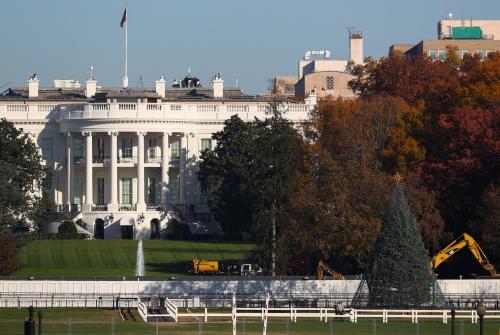
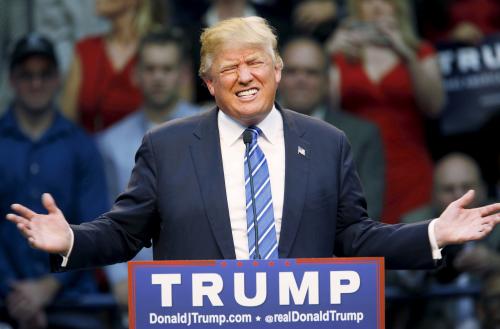
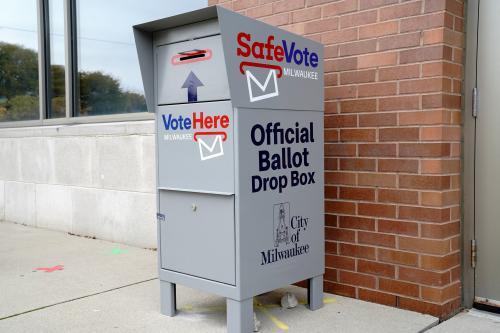

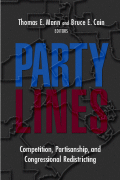
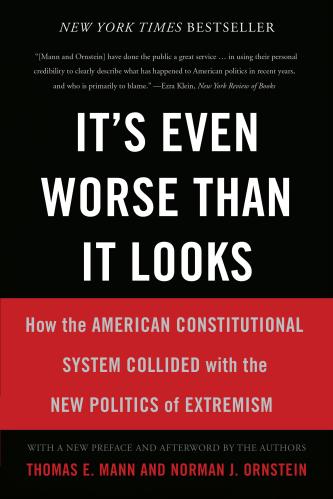




Commentary
Trump’s lies corrode democracy
April 13, 2018